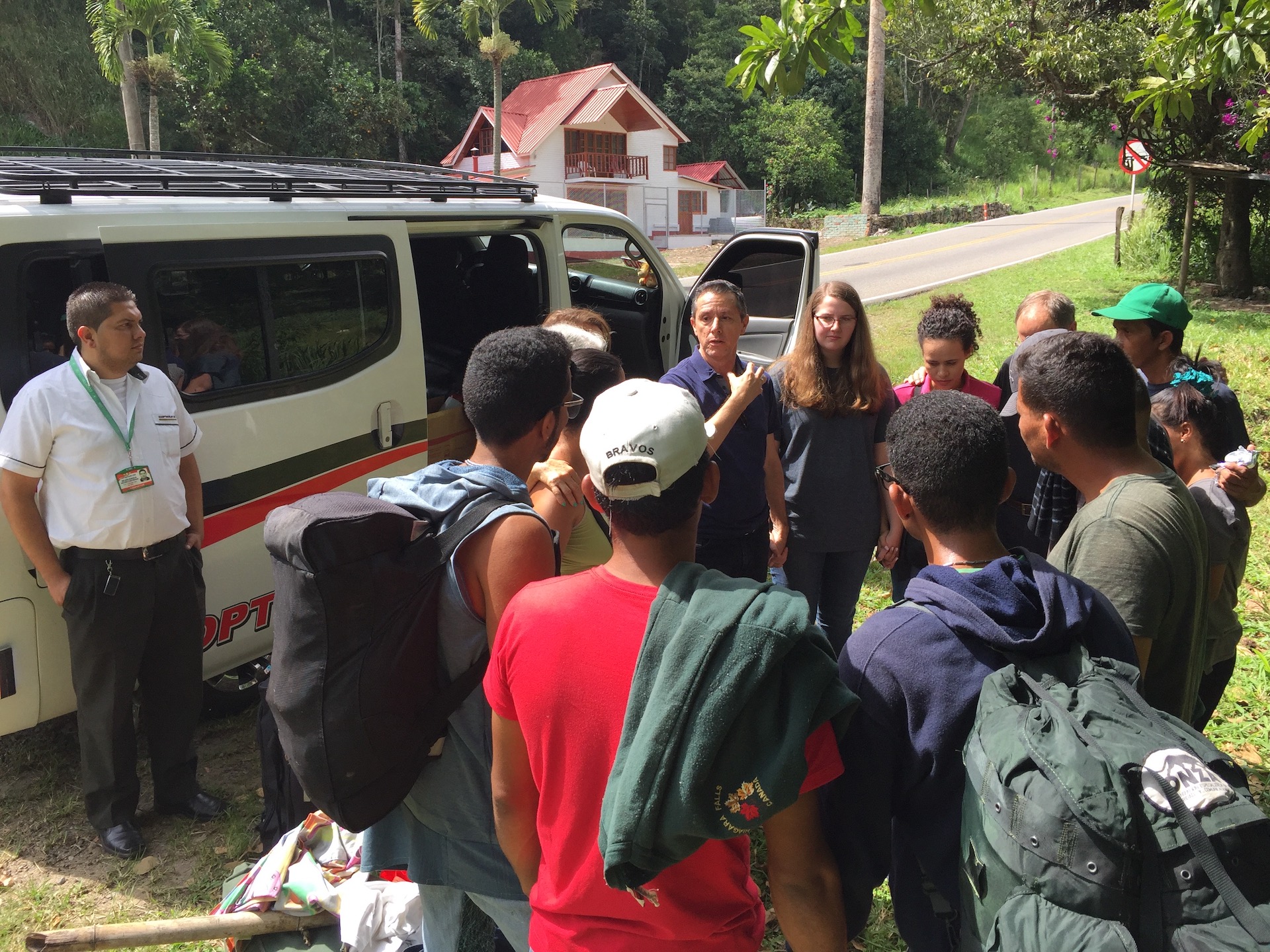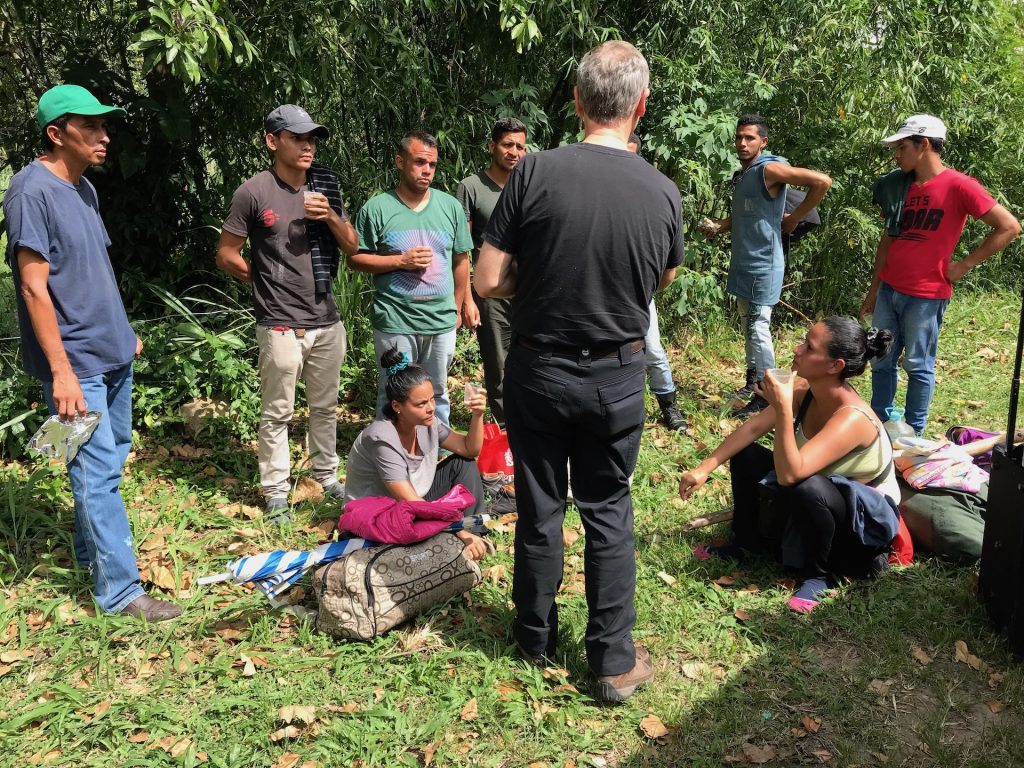The dark of night descends rapidly on the small plaza. A penetrating drizzle steadily drips onto the stone floor. About thirty-five men, most in short sleeves or sleeveless shirts, huddle under the only two trees. Rain sluices off the trees onto their heads. Two young women scurry to pull together an improvised tent composed of black plastic trash bags, at the same time attempting to keep dry a small girl in fuzzy footsie pajamas. A young couple sits in utter physical exhaustion, trying to shelter their eight-month-old son from the rain. Everyone is wet and everyone is cold.
This place is the first Colombian town of any size on the route up, over and along the high Andean cordillera on the arduous route from the Venezuelan border, across Colombia to the Ecuadorian border, across Ecuador to the Peruvian border, across Peru to the capital, and—for some—across Peru to Chile or Argentina. It represents only the first few days of travel by foot for Venezuelans fleeing the collapse of their nation—once one of the wealthiest on the continent. These men, women, the little girl, the baby boy are all on the first stage of a 2,700-mile trek by foot.

A Colombian pastor and IMB missionaries share clothes and information with Venezuelan walkers called “caminantes.”
They are only a handful of the two hundred to five hundred Venezuelans who pass this way every day of the week, some pushing the elderly in a wheelchair, many carrying a baby or child, a number well along in their pregnancy, nearly all dressed for hot climates. Most have no money, no food, and no connections outside of Venezuela. They have not eaten well for a long time in their home country, where a month’s salary will only buy two days’ worth of food. They have sold their homes and belongings to pay for bus fare across Venezuela to the Colombian border. Some cannot even do that; they walk a week across Venezuela to the border beforebeginning their long walk over multiple countries.
Here in neighboring Colombia, each Venezuelan on this dark night on a mountain plaza is sore, hungry, thirsty, cold, and wet. They have been walking steadily upward on the mountain highway for days. They carry with them everything they own in a backpack or small rolling suitcase: perhaps a change of clothes, perhaps photos of family left behind, perhaps work boots for a hoped-for future job. They come from flat, hot plains or the sultry coast. They have never known cold. They have never slept on the ground in a public plaza.
They have no coats, no jackets, no gloves, no sweaters, no scarves. Their socks (if they have any to begin with) and shoes are already in tatters. They wear flip flops, cheap loafers or low-cost tennis shoes. They are all headed toward a 10,000-foot mountain pass where at least twenty of their compatriots have died of hypothermia and exposure.
Their survival depends on strangers. Some strangers are kind; others are not. In a growing atmosphere of xenophobia against Venezuelan immigrants, some people are turning against them, some nations are slamming doors shut. In this town on this night, the townsfolk are in their cozy homes, eating dinner, preparing for a warm bed. They have seen floods of Venezuelans pass their shops and homes, all tired, all hungry, all penniless. It is time to look away. There is no room. Not tonight. Not for them.
Then the small miracle comes out of the night. A van pulls up across the street. A weary band of IMB missionaries descends. Since early morning they have been driving up the mountain, stopping each time they see a group of Venezuelans. They ask the Venezuelans to put down their heavy loads and sit for a moment while the missionaries give them hot sandwiches and hot chocolate. The missionaries bind up their battered shoes with silver duct tape and give out cold-weather clothing and gear donated by Colombian believers. They hear their stories and tell them a story of God’s love. They share suggestions for staying well, cry with them, hug them, pray with them and encourage them along the way.
This is the last stop. For eleven hours the missionaries have been doing this. For eleven hours they have heard and seen one heartbreaking story after another:
- The sixteen-year-old who has left home alone to find work to send money back to six younger siblings;
- The elderly man who has worked the soil all his life. There are no seeds now, he says. No jobs. He hopes someone will let him work their land and give him enough to eat;
- The woman in her fourth month of pregnancy hoping that she and her baby will live;
- The teenage girls walking to a 10,000-foot pass in sandals, capris and summer blouses.
Now, heading back down the mountain, the missionaries are fifty miles from returning to the border. The wet plaza is their last stop. The group of men on the plaza come to life as they realize what is being offered to them. The two women receive their sandwiches and drinks, warm jackets and scarves. Expressing thanks, they quickly retire with the little girl to their reconstructed trash bag tent. The men are reluctant to let the missionaries leave. Here are people with jackets for them. More importantly, these are people who see them as human beings and who have been where they are going, who have information.

IMB missionary Paul Tinley narrates the story of Joseph and God’s faithfulness to Venezuelan walkers.
“Will it be colder further on?” “Can anywhere be colder?” They are still at 7,000 feet. They still have another 3,000 feet in elevation to reach the pass, where nighttime temperatures range from 36 degrees to below freezing. A local pastor offers tips for the journey: Don’t climb into the mountain heights while hot and sweaty—a sure way to get bronchitis. Cool off first. A tip from one of the missionaries: Save the foil from the sandwiches. It can keep your hands warm.
A few feet away, the young couple with the baby is too exhausted to move one more step. They barely have the energy to extend their hands for the sandwiches. All day and evening the missionaries have zealously guarded their one child-size blanket, watching for that child who most needs it. Now the pink crocheted blanket wraps their little boy. It is the “wrong” color but no one cares. It is warm. It is good. The father sits by his wife and child, completely unable to care or provide for them in any way. As he takes his first sip of hot chocolate, the hot tears begin to flow down his face and will not stop.
As Christmas approaches, Venezuelans are still walking toward what they hope will be a better life. Will you continue to pray that they will find the hope that came to earth through a newborn Savior?

